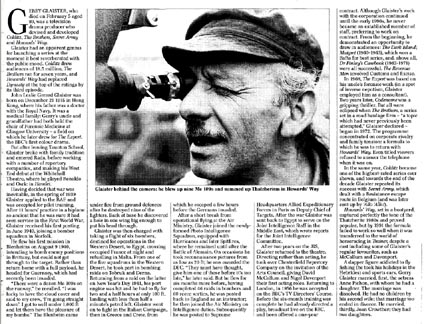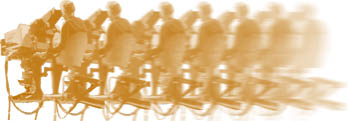I'm not eager to make this an obit site, but a number of old friends have died recently,
and people have sent in various memories - so this is going to be the obit page (and yes, I know there are others earlier)
From Bob Glaister
Bob shares a surname, though not a family, with Gerry Glaister - one of the BBC's great drama producers. What Gerry made didn't change the world, nor was
it regarded as ground-breaking, but he did entertain a huge number of people for very many years, and perhaps in the great scheme of things that's more important.
Bob sent this from The Daily Telegraph - click for large

From Pat Heigham
Also recently died, Johnny Downes, originator of Crackerjack (CRACKERJAAACK!!).
Pat Heigham worked with Johnny and remembers -
"I certainly remember and enjoyed working on Crackerjack, and
on Lennie the Lion - a most embarrasing thing happened when
I was working the OP side set boom, on Terry Hall and Lennie.
So fooled was I by the vent act, that I was favouring the puppet!
Adrian Stocks, mixing in the gallery, hit the talkback and informed
me that the Lion was always 'off-mic' 'There's only one of them
talking, Pat!'"
This also from The Daily Telegraph -
(Filed: 10/02/2005)
Johnny Downes, who has died aged 84, was the originator of Crackerjack, the BBC's first live children's television programme.
Made up of sketches, competitions, corny jokes and pop star guests, at the height of its popularity it began with the words
"It's Friday, it's five to five, and it's Crackerjack". The studio audience screamed in response, sending adult fingers instinctively
toward the off-switch.
The name was dreamed up by Downes, and the first programme was introduced in 1955 by Eamonn Andrews, who devised its general
knowledge quiz "Double or Drop", in which children were loaded with prizes for a right answer and cabbages for wrong ones.
Downes first brought Leslie Crowther on to the show to do a series of sketches with Peter Glaze, and when Andrews gave up,
asked Crowther to become the presenter. The programme continued under a number of hosts until 1984; it was last revived for
a time as part of Blue Peter in 2002.
Downes resigned from the BBC to emigrate to Australia, and was astonished when Crowther came to the station at 6 am to see
him and his wife off.
But although Downes produced the programme for the ABC, he and his wife returned home after eight months, and he was lucky
to be able to rejoin the BBC. He went on to produce a show featuring Basil Brush, whose "Boom boom" attracted a large
audience (the Queen Mother was a fan), and another with Shari Lewis and Lamb Chop.
John Haddon Downes was born on June 26 1920 and went to King's School, Grantham. He had started to train as a surveyor
when war was declared. Downes joined No 604 Squadron (County of Middlesex) and became a flight lieutenant navigator in
Mosquito night fighters. He and his pilot, Squadron Leader Dennis Furse, with whom he remained throughout the war, were
first based in southern England, guarding against a possible invasion; they maintained patrols over the Normandy beachhead
in June 1944, before moving to France to join in the night defence of airfields. In October that year, both men were awarded
the DFC; according to the citation, they had shown "keenness and determination of a high order" in destroying three enemy aircraft.
After the war Downes decided on a theatrical career. He secured some work as an actor in London, but his first break followed
a chance meeting in the Strand with the composer Ivor Novello, who offered him a job as stage manager on King's Rhapsody.
During the run, Downes met Barbara Whiting, a singer and actress who subsequently appeared in other London productions
such as South Pacific and Guys and Dolls; they were married in 1951.
Further stage management followed, and a brief period as ringmaster with a circus, when Downes once had to duck to avoid
the droppings of an elephant which came close to his box beside the ring.
But, deciding that he needed financial security, Downes joined the BBC in 1953 as a floor manager; he was soon promoted
to producer, and his first show featured the puppet Lennie the Lion. He was then given a modest budget for six shows by
Freda Lindstrom, who was in charge of children's television, and came up with Crackerjack. Downes's other work included
two stints with Call My Bluff, which he produced until his retirement in 1980.
Johnny Downes and his wife settled in Devon, where they enjoyed such popularity that the girls from the local supermarket
attended his funeral. He died on December 28.
From Paul Kay -
I and several cameramen of my generation worked with Dame Alicia Markova. What a joy she was, frequently guesting on programmes
like 'Music for You' and 'Music in Camera' etc etc.
One evening she was guesting for a half hour prog at Riverside Studios.
I do not recall the Ballet - possibly the producer/director was Maggie Dale, herself a wonderful dancer in her own right.
We rehearsed the programme and then went to dinner When we returned to the Studio, Alicia wanted a
quick rehearsal to warm up - fine we could all do with another camera rehearsal.
"Cue music!" After a dozen steps Alicia went
Base over Apex - the floor had been painted during the break and was like an ice rink. Alicia pick herself up shook herself
down. She was severely bruised and shaken but carried on as though nothing had happened. What a professional! It was
a priviledge to work with such persons.


